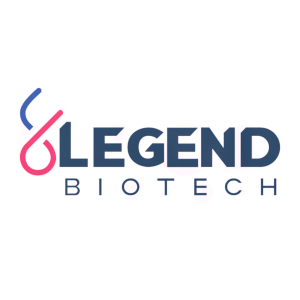Legend Biotech Announces 10 Presentations at the 67th American Society of Hematology (ASH) Annual Meeting
Rhea-AI Summary
Legend Biotech (NASDAQ: LEGN) announced 10 presentations at the 67th ASH Annual Meeting, Dec 6-9, 2025 in Orlando.
The program includes two oral and seven poster presentations on CARVYKTI (ciltacabtagene autoleucel) for multiple myeloma and an oral presentation of first-in-human Phase 1 data for Lucar-G39D, an allogeneic anti-CD20/CD19 dual-CAR gamma delta T cell therapy for relapsed/refractory B-cell NHL.
CARVYKTI is noted as commercially available in 14 countries and used to treat more than 9,000 patients to date.
Positive
- None.
Negative
- None.
News Market Reaction 1 Alert
On the day this news was published, LEGN declined 0.83%, reflecting a mild negative market reaction.
Data tracked by StockTitan Argus on the day of publication.
Two oral and seven poster presentations further support the CARVYKTI® research in multiple myeloma
First-in-Human Phase 1 data for allogeneic CAR-T cell therapy for NHL to be featured in oral session
SOMERSET, N.J., Nov. 03, 2025 (GLOBE NEWSWIRE) -- Legend Biotech Corporation (NASDAQ: LEGN) (Legend Biotech), a global leader in cell therapy, today announced that it will present two oral presentations and seven poster presentations on CARVYKTI® (ciltacabtagene autoleucel; cilta-cel) for multiple myeloma at the 67th Annual American Society of Hematology (ASH) Annual Meeting taking place from December 6-9, 2025, in Orlando, FL.
In addition to the CARVYKTI data, the Company will also deliver an oral presentation on Lucar-G39D, its investigational and novel anti-CD20/CD19 dual-CAR allogeneic gamma delta T cell therapy, being evaluated in patients with relapsed or refractory B-cell non-Hodgkin lymphoma (NHL).
“We’re proud to see the depth and breadth of data being presented at ASH this year, reflecting the continued innovation and clinical impact of our cell therapy programs,” said Ying Huang, Ph.D., Chief Executive Officer of Legend Biotech. “With nine abstracts highlighting CARVYKTI, these presentations further demonstrate the durability of responses, evolving safety profile, and real-world outcomes that support the potential of CAR-T therapy earlier in the multiple myeloma treatment journey. In addition, our first-in-human data on Lucar-G39D highlights our ongoing efforts to expand our pipeline into next-generation allogeneic cell therapies for patients with B-cell malignancies.”
CARVYKTI is the first and only BCMA-targeted CAR-T cell therapy approved for the treatment of patients with multiple myeloma who have had at least one prior line of therapy. Globally, CARVYKTI is now commercially available in 14 countries and has been used to treat more than 9,000 patients to date.
ASH Presentations (December 6-9, 2025)
| CARVYKTI® | ||
| Abstract No. | Title | Information |
| Abstract #94 Oral Presentation | Long-Term Progression-Free Survival Benefit With Ciltacabtagene Autoleucel in Standard-Risk Relapsed/Refractory Multiple Myeloma | Session Name: 653. Multiple Myeloma: Clinical and Epidemiological: Optimizing Immune-Based Therapies in Myeloma: From T-Cell Fitness to Clinical Outcomes Date: December 6, 2025 Session Time: 9:30 AM - 11:00 AM Presentation Time: 10:15 AM - 10:30 AM Location: OCCC - West Hall D2 |
| Abstract #92 Oral Presentation | Earlier Use of Ciltacabtagene Autoleucel (Cilta-cel) Is Associated With Better Immune Fitness and Stronger Immune Effects as Shown by Correlative Analysis of Peripheral Blood and the Bone Marrow Tumor Microenvironment (TME) From the CARTITUDE-4 Study | Session Name: 653. Multiple Myeloma: Clinical and Epidemiological: Optimizing Immune-Based Therapies in Myeloma: From T-Cell Fitness to Clinical Outcomes Date: December 6, 2025 Session Time: 9:30 AM - 11:00 AM Presentation Time: 9:45 AM - 10:00 AM Location: OCCC - West Hall D2 |
| Abstract #2215 Poster | Effectiveness of Bridging Therapy Corresponds to Improved Outcomes After Ciltacabtagene Autoleucel: Phase 3 CARTITUDE-4 Study of Patients with Relapsed, Lenalidomide-Refractory Multiple Myeloma | Session Name: 653. Multiple Myeloma: Clinical and Epidemiological: Poster I Date: December 6, 2025 Time: 5:30 PM - 7:30 PM Location: OCCC - West Halls B3-B4 |
| Abstract #4046 Poster | Comparative Efficacy of Ciltacabtagene Autoleucel (Cilta-cel) Versus Belantamab Mafodotin (Belamaf), Bortezomib, and Dexamethasone and Versus Belamaf, Pomalidomide, and Dexamethasone in Patients with Relapsed/Refractory Multiple Myeloma (RRMM) Previously Treated with 1–3 Prior Lines of Therapy Using a Matching-Adjusted Indirect Comparison | Session Name: 654. Multiple Myeloma: Pharmacologic Therapies: Poster II Date: December 7, 2025 Time: 6:00 PM - 8:00 PM Location: OCCC - West Halls B3-B4 |
| Abstract #3992 Poster | Population Differences and Comparative Efficacy Between Ciltacabtagene Autoleucel (Cilta-cel) From the CARTITUDE-1 Study and Anitocabtagene Autoleucel (Anito-cel) From the iMMagine-1 Study in Patients with Relapsed/Refractory Multiple Myeloma (RRMM) | Session Name: 653. Multiple Myeloma: Clinical and Epidemiological: Poster II Date: December 7, 2025 Time: 6:00 PM - 8:00 PM Location: OCCC - West Halls B3-B4 |
| Abstract #5768 Poster | Quality-adjusted Survival Analysis of Neurologic Events with Ciltacabtagene Autoleucel (cilta-cel) vs Standard of Care (SOC) in Patients (Pts) with Lenalidomide-refractory Multiple Myeloma (MM) who Received 1–3 Prior Lines of Therapy (LOT): CARTITUDE-4 Trial Population (Pop) | Session Name: 653. Multiple Myeloma: Clinical and Epidemiological: Poster III Date: December 8, 2025 Time: 6:00 PM - 8:00 PM Location: OCCC - West Halls B3-B4 |
| Abstract #2214 Poster | Bridging Therapy Response and Low Pre-lymphodepletion Plasma Cell Burden Are Associated with Improved Safety and Efficacy Outcomes of Ciltacabtagene Autoleucel in Multiple Myeloma | Session Name: 653. Multiple Myeloma: Clinical and Epidemiological: Poster I Date: December 6, 2025 Time: 5:30 PM - 7:30 PM Location: OCCC - West Halls B3-B4 |
| Abstract #4596 Poster | Real-world Incidence and Management of Non-ICANS Neurologic Events Following Ciltacabtagene Autoleucel in Multiple Myeloma | Session Name: 907. Outcomes Research: Plasma Cell Disorders: Poster II Date: December 7, 2025 Time: 6:00 PM - 8:00 PM Location: OCCC - West Halls B3-B4 |
| Abstract #2411 Poster | Ciltacabtagene Autoleucel Out-of-Specification Manufacturing Outcomes Improve with Earlier Lines of Therapy | Session Name: 711. Cell Collection and Manufacturing of HSPCs, CAR-T Cells, and Other Cellular Therapy Products: Poster I Date: December 6, 2025 Time: 5:30 PM - 7:30 PM Location: OCCC - West Halls B3-B4 |
| Allogeneic CAR-T Cell Therapy | ||
| Abstract No. | Title | Session Details |
| Abstract #266 Oral Presentation | A Phase 1 Study of Lucar-G39D: A Novel Anti-CD20/CD19 Dual-CAR Allogeneic Gamma Delta T Cells in Adults with Relapsed / Refractory B-Cell Non-Hodgkin Lymphoma (NHL) | Session Name: 704. Cellular Immunotherapies: Early Phase Clinical Trials and Toxicities: Next Generation CAR-T Clinical Trials in Relapsed/Refractory B-cell Non-Hodgkin Lymphoma and Multiple Myeloma Session Date: December 6, 2025 Session Time: 2:00 PM - 3:30 PM Presentation Time: 2:15 PM - 2:30 PM Location: OCCC - West Hall D2 |
CARVYKTI® IMPORTANT SAFETY INFORMATION
| WARNING: CYTOKINE RELEASE SYNDROME, NEUROLOGIC TOXICITIES, HLH/MAS, PROLONGED and RECURRENT CYTOPENIA, and SECONDARY HEMATOLOGICAL MALIGNANCIES |
Cytokine Release Syndrome (CRS), including fatal or life-threatening reactions, occurred in patients following treatment with CARVYKTI®. Do not administer CARVYKTI® to patients with active infection or inflammatory disorders. Treat severe or life-threatening CRS with tocilizumab or tocilizumab and corticosteroids. Immune Effector Cell-associated Neurotoxicity Syndrome (ICANS), which may be fatal or life-threatening, occurred following treatment with CARVYKTI®, including before CRS onset, concurrently with CRS, after CRS resolution, or in the absence of CRS. Monitor for neurologic events after treatment with CARVYKTI®. Provide supportive care and/or corticosteroids as needed. Parkinsonism and Guillain-Barré syndrome (GBS) and their associated complications resulting in fatal or life-threatening reactions have occurred following treatment with CARVYKTI®. Hemophagocytic Lymphohistiocytosis/Macrophage Activation Syndrome (HLH/MAS), including fatal and life-threatening reactions, occurred in patients following treatment with CARVYKTI®. HLH/MAS can occur with CRS or neurologic toxicities. Prolonged and/or recurrent cytopenias with bleeding and infection and requirement for stem cell transplantation for hematopoietic recovery occurred following treatment with CARVYKTI®. Immune Effector Cell-associated Enterocolitis (IEC-EC), including fatal or life-threatening reactions, occurred following treatment with CARVYKTI®. Secondary hematological malignancies, including myelodysplastic syndrome and acute myeloid leukemia, have occurred in patients following treatment with CARVYKTI®. T-cell malignancies have occurred following treatment of hematologic malignancies with BCMA- and CD19-directed genetically modified autologous T-cell immunotherapies, including CARVYKTI®. |
WARNINGS AND PRECAUTIONS
INCREASED EARLY MORTALITY - In CARTITUDE-4, a (1:1) randomized controlled trial, there was a numerically higher percentage of early deaths in patients randomized to the CARVYKTI® treatment arm compared to the control arm. Among patients with deaths occurring within the first 10 months from randomization, a greater proportion (29/208;
CYTOKINE RELEASE SYNDROME (CRS), including fatal or life-threatening reactions, occurred following treatment with CARVYKTI®. Among patients receiving CARVYKTI® for RRMM in the CARTITUDE-1 & -4 studies (N=285), CRS occurred in
Identify CRS based on clinical presentation. Evaluate for and treat other causes of fever, hypoxia, and hypotension. CRS has been reported to be associated with findings of HLH/MAS, and the physiology of the syndromes may overlap. HLH/MAS is a potentially life-threatening condition. In patients with progressive symptoms of CRS or refractory CRS despite treatment, evaluate for evidence of HLH/MAS.
Confirm that a minimum of 2 doses of tocilizumab are available prior to infusion of CARVYKTI®.
Of the 285 patients who received CARVYKTI® in clinical trials,
Monitor patients at least daily for 7 days following CARVYKTI® infusion for signs and symptoms of CRS. Monitor patients for signs or symptoms of CRS for at least 2 weeks after infusion. At the first sign of CRS, immediately institute treatment with supportive care, tocilizumab, or tocilizumab and corticosteroids.
Counsel patients to seek immediate medical attention should signs or symptoms of CRS occur at any time.
NEUROLOGIC TOXICITIES, which may be severe, life-threatening, or fatal, occurred following treatment with CARVYKTI®. Neurologic toxicities included ICANS, neurologic toxicity with signs and symptoms of Parkinsonism, GBS, immune mediated myelitis, peripheral neuropathies, and cranial nerve palsies. Counsel patients on the signs and symptoms of these neurologic toxicities, and on the delayed nature of onset of some of these toxicities. Instruct patients to seek immediate medical attention for further assessment and management if signs or symptoms of any of these neurologic toxicities occur at any time.
Among patients receiving CARVYKTI® in the CARTITUDE-1 & 4 studies for RRMM, one or more neurologic toxicities occurred in
Immune Effector Cell-Associated Neurotoxicity Syndrome (ICANS): Patients receiving CARVYKTI® may experience fatal or life-threatening ICANS following treatment with CARVYKTI®, including before CRS onset, concurrently with CRS, after CRS resolution, or in the absence of CRS.
Among patients receiving CARVYKTI® in the CARTITUDE-1 & -4 studies, ICANS occurred in
Immune Effector Cell-associated Neurotoxicity Syndrome occurred in
Monitor patients at least daily for 7 days following CARVYKTI® infusion for signs and symptoms of ICANS. Rule out other causes of ICANS symptoms. Monitor patients for signs or symptoms of ICANS for at least 2 weeks after infusion and treat promptly. Neurologic toxicity should be managed with supportive care and/or corticosteroids as needed. Advise patients to avoid driving for at least 2 weeks following infusion.
Parkinsonism: Neurologic toxicity with parkinsonism has been reported in clinical trials of CARVYKTI®. Among patients receiving CARVYKTI® in the CARTITUDE-1 & -4 studies, parkinsonism occurred in
Parkinsonism occurred in
Manifestations of parkinsonism included movement disorders, cognitive impairment, and personality changes. Monitor patients for signs and symptoms of parkinsonism that may be delayed in onset and managed with supportive care measures. There is limited efficacy information with medications used for the treatment of Parkinson’s disease for the improvement or resolution of parkinsonism symptoms following CARVYKTI® treatment.
Guillain-Barré Syndrome: A fatal outcome following GBS occurred following treatment with CARVYKTI® despite treatment with intravenous immunoglobulins. Symptoms reported include those consistent with Miller-Fisher variant of GBS, encephalopathy, motor weakness, speech disturbances, and polyradiculoneuritis.
Monitor for GBS. Evaluate patients presenting with peripheral neuropathy for GBS. Consider treatment of GBS with supportive care measures and in conjunction with immunoglobulins and plasma exchange, depending on severity of GBS.
Immune Mediated Myelitis: Grade 3 myelitis occurred 25 days following treatment with CARVYKTI® in CARTITUDE-4 in a patient who received CARVYKTI® as subsequent therapy. Symptoms reported included hypoesthesia of the lower extremities and the lower abdomen with impaired sphincter control. Symptoms improved with the use of corticosteroids and intravenous immune globulin. Myelitis was ongoing at the time of death from other cause.
Peripheral Neuropathy occurred following treatment with CARVYKTI®. Among patients receiving CARVYKTI® in the CARTITUDE-1 & -4 studies, peripheral neuropathy occurred in
Peripheral neuropathies occurred in
Cranial Nerve Palsies occurred following treatment with CARVYKTI®. Among patients receiving CARVYKTI® in the CARTITUDE-1 & -4 studies, cranial nerve palsies occurred in
The most frequent cranial nerve affected was the 7th cranial nerve. Additionally, cranial nerves III, V, and VI have been reported to be affected.
Monitor patients for signs and symptoms of cranial nerve palsies. Consider management with systemic corticosteroids, depending on the severity and progression of signs and symptoms.
HEMOPHAGOCYTIC LYMPHOHISTIOCYTOSIS (HLH)/MACROPHAGE ACTIVATION SYNDROME (MAS): Among patients receiving CARVYKTI® in the CARTITUDE-1 & -4 studies, HLH/MAS occurred in
Patients who develop HLH/MAS have an increased risk of severe bleeding. Monitor hematologic parameters in patients with HLH/MAS and transfuse per institutional guidelines. Fatal cases of HLH/MAS occurred following treatment with CARVYKTI®.
HLH is a life-threatening condition with a high mortality rate if not recognized and treated early. Treatment of HLH/MAS should be administered per institutional standards.
PROLONGED AND RECURRENT CYTOPENIAS: Patients may exhibit prolonged and recurrent cytopenias following lymphodepleting chemotherapy and CARVYKTI® infusion.
Among patients receiving CARVYKTI® in the CARTITUDE-1 & -4 studies, Grade 3 or higher cytopenias not resolved by Day 30 following CARVYKTI® infusion occurred in
Monitor blood counts prior to and after CARVYKTI® infusion. Manage cytopenias with growth factors and blood product transfusion support according to local institutional guidelines.
INFECTIONS: CARVYKTI® should not be administered to patients with active infection or inflammatory disorders. Severe, life-threatening, or fatal infections occurred in patients after CARVYKTI® infusion.
Among patients receiving CARVYKTI® in the CARTITUDE-1 & -4 studies, infections occurred in
Monitor patients for signs and symptoms of infection before and after CARVYKTI® infusion and treat patients appropriately. Administer prophylactic, pre-emptive, and/or therapeutic antimicrobials according to the standard institutional guidelines. Febrile neutropenia was observed in
Viral Reactivation: Hepatitis B virus (HBV) reactivation, in some cases resulting in fulminant hepatitis, hepatic failure, and death, can occur in patients with hypogammaglobulinemia. Perform screening for Cytomegalovirus (CMV), HBV, hepatitis C virus (HCV), and human immunodeficiency virus (HIV) or any other infectious agents if clinically indicated in accordance with clinical guidelines before collection of cells for manufacturing. Consider antiviral therapy to prevent viral reactivation per local institutional guidelines/clinical practice.
Reactivation of John Cunningham (JC) virus, leading to progressive multifocal leukoencephalopathy (PML), including cases with fatal outcomes, have been reported following treatment. Perform appropriate diagnostic evaluations in patients with neurological adverse events.
HYPOGAMMAGLOBULINEMIA: can occur in patients receiving treatment with CARVYKTI®. Among patients receiving CARVYKTI® in the CARTITUDE-1 & -4 studies, hypogammaglobulinemia adverse event was reported in
Monitor immunoglobulin levels after treatment with CARVYKTI® and administer IVIG for IgG <400 mg/dL. Manage per local institutional guidelines, including infection precautions and antibiotic or antiviral prophylaxis.
Use of Live Vaccines: The safety of immunization with live viral vaccines during or following CARVYKTI® treatment has not been studied. Vaccination with live virus vaccines is not recommended for at least 6 weeks prior to the start of lymphodepleting chemotherapy, during CARVYKTI® treatment, and until immune recovery following treatment with CARVYKTI®.
HYPERSENSITIVITY REACTIONS occurred following treatment with CARVYKTI®. Among patients receiving CARVYKTI® in the CARTITUDE-1 & -4 studies, hypersensitivity reactions occurred in
Serious hypersensitivity reactions, including anaphylaxis, may be due to the dimethyl sulfoxide (DMSO) in CARVYKTI®. Patients should be carefully monitored for 2 hours after infusion for signs and symptoms of severe reaction. Treat promptly and manage patients appropriately according to the severity of the hypersensitivity reaction.
IMMUNE EFFECTOR CELL-ASSOCIATED ENTERCOLITIS (IEC-EC) has occurred in patients treated with CARVYKTI®. Manifestations include severe or prolonged diarrhea, abdominal pain, and weight loss requiring parenteral nutrition. IEC-EC has been associated with fatal outcome from perforation or sepsis. Manage according to institutional guidelines, including referral to gastroenterology and infectious disease specialists.
In cases of refractory IEC-EC, consider additional workup to exclude alternative etiologies, including T-cell lymphoma of the GI tract, which has been reported in the post marketing setting.
SECONDARY MALIGNANCIES: Patients treated with CARVYKTI® may develop secondary malignancies. Among patients receiving CARVYKTI® in the CARTITUDE-1 & -4 studies, myeloid neoplasms occurred in
Monitor lifelong for secondary malignancies. In the event that a secondary malignancy occurs, contact Janssen Biotech, Inc., at 1-800-526-7736 for reporting and to obtain instructions on collection of patient samples.
ADVERSE REACTIONS
The most common nonlaboratory adverse reactions (incidence greater than
Please read full Prescribing Information, including Boxed Warning, for CARVYKTI®.
ABOUT CARVYKTI® (CILTACABTAGENE AUTOLEUCEL; CILTA-CEL)
Ciltacabtagene autoleucel is a BCMA-directed, genetically modified autologous T-cell immunotherapy, which involves reprogramming a patient’s own T-cells with a transgene encoding a chimeric antigen receptor (CAR) that identifies and eliminates cells that express BCMA. The cilta-cel CAR protein features two BCMA-targeting single domain antibodies designed to confer high avidity against human BCMA. Upon binding to BCMA-expressing cells, the CAR promotes T-cell activation, expansion, and elimination of target cells.i
In December 2017, Legend Biotech entered into an exclusive worldwide license and collaboration agreement with Janssen Biotech, Inc. (Janssen), a Johnson & Johnson company, to develop and commercialize cilta-cel. In February 2022, cilta-cel was approved by the U.S. Food and Drug Administration (FDA) under the brand name CARVYKTI® for the treatment of adults with relapsed or refractory multiple myeloma. In April 2024, cilta-cel was approved for the second-line treatment of patients with relapsed/refractory myeloma who have received at least one prior line of therapy, including a proteasome inhibitor, an immunomodulatory agent, and are refractory to lenalidomide.
In May 2022, the European Commission (EC) granted conditional marketing authorization of CARVYKTI® for the treatment of adults with relapsed and refractory multiple myeloma. In September 2022, Japan’s Ministry of Health, Labour and Welfare (MHLW) approved CARVYKTI®. Cilta-cel was granted Breakthrough Therapy Designation in the U.S. in December 2019 and in China in August 2020. In addition, cilta-cel received a PRIority MEdicines (PRIME) designation from the European Commission in April 2019. Cilta-cel also received Orphan Drug Designation from the U.S. FDA in February 2019, from the European Commission in February 2020, and from the Pharmaceuticals and Medicinal Devices Agency (PMDA) in Japan in June 2020. In March 2022, the European Medicines Agency’s Committee for Orphan Medicinal Products recommended by consensus that the orphan designation for cilta-cel be maintained on the basis of clinical data demonstrating improved and sustained complete response rates following treatment.
ABOUT CARTITUDE-4
CARTITUDE-4 (NCT04181827) is an ongoing, international, randomized, open-label Phase 3 study evaluating the efficacy and safety of cilta-cel versus pomalidomide, bortezomib and dexamethasone (PVd) or daratumumab, pomalidomide, and dexamethasone (DPd) in adult patients with relapsed and lenalidomide-refractory multiple myeloma who received one to three prior lines of therapy, including a PI and an IMiD.ii
ABOUT CARTITUDE-1
CARTITUDE-1 (NCT03548207) is a Phase 1b/2, open-label, multicenter study evaluating the safety and efficacy of cilta-cel in adults with relapsed and/or refractory with multiple myeloma who have received at least 3 prior lines of therapy or are double refractory to a PI and IMiD, received a PI, an IMiD, and anti-CD38 antibody and documented disease progression within 12 months of starting the most recent therapy. The primary objective of the Phase 1b portion of the study was to characterize the safety and confirm the recommended Phase 2 dose of cilta-cel, informed by the first-in-human study with LCAR-B38M CAR-T cells (LEGEND-2). The Phase 2 portion further evaluated the efficacy of cilta-cel with overall response rate as the primary endpoint.iii
ABOUT LUCAR-G39D
NCT06395870 is a Phase I, open-label clinical study to evaluate the safety, tolerability, and efficacy of LUCAR-G39D, a dual-targeted cell preparation targeting CD19/CD20, in patients with relapsed/refractory B-cell non-Hodgkin lymphoma.iv
About MULTIPLE MYELOMA
Multiple myeloma is an incurable blood cancer that starts in the bone marrow and is characterized by an excessive proliferation of plasma cells.v In 2024, it is estimated that more than 35,000 people will be diagnosed with multiple myeloma, and more than 12,000 people will die from the disease in the U.S.vi While some patients with multiple myeloma initially have no symptoms, most patients are diagnosed due to symptoms that can include bone problems, low blood counts, calcium elevation, kidney problems, or infections.vii
About Legend Biotech
With over 2,800 employees, Legend Biotech is the largest standalone cell therapy company and a pioneer in treatments that change cancer care forever. The company is at the forefront of the CAR-T cell therapy revolution with CARVYKTI®, a one-time treatment for relapsed or refractory multiple myeloma, which it develops and markets with collaborator Johnson & Johnson. Headquartered in the US, Legend is building an end-to-end cell therapy company by expanding its leadership to maximize CARVYKTI’s patient access and therapeutic potential. From this platform, the company plans to drive future innovation across its pipeline of cutting-edge cell therapy modalities.
Learn more at www.legendbiotech.com and follow us on LinkedIn.
CAUTIONARY NOTE REGARDING FORWARD-LOOKING STATEMENTS
Statements in this press release about future expectations, plans, and prospects, as well as any other statements regarding matters that are not historical facts, constitute “forward-looking statements” within the meaning of The Private Securities Litigation Reform Act of 1995. These statements include, but are not limited to, statements relating to Legend Biotech’s strategies and objectives, and the potential benefits of Legend Biotech’s product candidates. The words “anticipate,” “believe,” “continue,” “could,” “estimate,” “expect,” “intend,” “may,” “plan,” “potential,” “predict,” “project,” “should,” “target,” “will,” “would” and similar expressions are intended to identify forward-looking statements, although not all forward-looking statements contain these identifying words. Actual results may differ materially from those indicated by such forward-looking statements as a result of various important factors. Legend Biotech’s expectations could be affected by, among other things, uncertainties involved in the development of new pharmaceutical products; unexpected clinical trial results, including as a result of additional analysis of existing clinical data or unexpected new clinical data; unexpected regulatory actions or delays, including requests for additional safety and/or efficacy data or analysis of data, or government regulation generally; unexpected delays as a result of actions undertaken, or failures to act, by our third-party partners; uncertainties arising from challenges to Legend Biotech’s patent or other proprietary intellectual property protection, including the uncertainties involved in the U.S. litigation process; government, industry, and general product pricing and other political pressures; as well as the other factors discussed in the “Risk Factors” section of Legend Biotech’s Annual Report on Form 20-F filed with the Securities and Exchange Commission on March 11, 2025. Should one or more of these risks or uncertainties materialize, or should underlying assumptions prove incorrect, actual results may vary materially from those described in this press release as anticipated, believed, estimated, or expected. Any forward-looking statements contained in this press release speak only as of the date of this press release. Legend Biotech specifically disclaims any obligation to update any forward-looking statement, whether as a result of new information, future events, or otherwise.
INVESTOR CONTACT:
Jessie Yeung
Tel: (732) 956-8271
jessie.yeung@legendbiotech.com
PRESS CONTACT:
Alexandra Ventura
Tel: (732) 850-5598
media@legendbiotech.com
________________________
i CARVYKTI™ Prescribing Information. Horsham, PA: Janssen Biotech, Inc.
ii ClinicalTrials.gov. A Study Comparing JNJ-68284528, a CAR-T Therapy Directed Against B-cell Maturation Antigen (BCMA), Versus Pomalidomide, Bortezomib and Dexamethasone (PVd) or Daratumumab, Pomalidomide and Dexamethasone (DPd) in Participants With Relapsed and Lenalidomide-Refractory Multiple Myeloma (CARTITUDE-4). https://www.clinicaltrials.gov/study/NCT04181827. Accessed March 2024.
iii ClinicalTrials.gov. A Study of JNJ-68284528, a Chimeric Antigen Receptor T Cell (CAR-T) Therapy Directed Against B-Cell Maturation Antigen (BCMA) in Participants With Relapsed or Refractory Multiple Myeloma (CARTITUDE-1). Available at: https://clinicaltrials.gov/ct2/show/NCT03548207 Accessed October 2022.
iv ClinicalTrials.gov. Targeting CD19/CD20 Dual-targeted Cell in Patients With Relapsed/Refractory B-cell Non-Hodgkin Lymphoma. Available at: https://clinicaltrials.gov/study/NCT06395870 Accessed November 2024.
v American Cancer Society. ”What is Multiple Myeloma?”. Available at: https://www.cancer.org/cancer/types/multiple-myeloma/about/what-is-multiple-myeloma.html. Accessed March 2024.
vi American Cancer Society. “Key Statistics About Multiple Myeloma.” Available at: https://www.cancer.org/cancer/types/multiple-myeloma/about/key-statistics.html. Accessed March 2024
vii American Cancer Society. Multiple myeloma: early detection, diagnosis, and staging. Available at: https://www.cancer.org/content/dam/CRC/PDF/Public/8740.00.pdf. Accessed March 2023.









